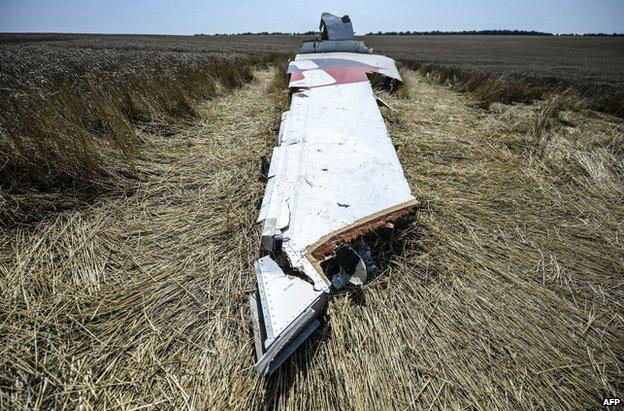Europe's troubles exposed by MH17 crash
- Published
- comments

Wreckage from Flight MH17 in a field in east Ukraine
Ukraine exposes Europe. Its agony and tragedy casts an unrelenting gaze on Europe's leaders. When it comes to sending a convincing message to Russia there have been months of indecision, weakness and self-interest.
Even after the reported shooting down of the Malaysian airliner, Europe's foreign ministers struggled to convince. They described their decisions as "forceful" but it remains unclear how many names will be added to the list of those facing travel bans and a freeze of their assets. It is said they will include some of Russian President Vladimir Putin's cronies. We shall see.
The ministers opened up the possibility of imposing broader economic sanctions on the arms, energy and financial services sectors, but the EU was actually given a mandate to do this in March. To go further would require another European summit and unanimity would be hard to find.
The vacuum of decision-making is filled with finger-pointing. UK Prime Minister David Cameron said it would have been "unthinkable" for the British to have gone ahead with the sale of two warships to Russia as the French are doing.
Here in Paris the French papers are crying "hypocrites" and French Foreign Minister Laurent Fabius was at his most withering when he said: "I say to my dear British friends, let's speak of finance. I'm led to believe there are quite a few oligarchs in London."
And the British are still authorising the export of arms and military equipment to Russia despite calls for tougher sanctions.
The Germans are preoccupied with the potential damage to their own economy if sanctions push Russia into a recession. In that event, it is being suggested 25,000 German jobs could be in danger and growth could be reduced by 0.5%.
There are signs, however, that Chancellor Angel Merkel is hardening her views. She has said it is time to implement new sanctions and is said to moving closer to Washington's position.
Weakness
The Italians provided a flash of insight. Their Economy Minister, Pier Carlo Padoan, said: "Recent German economic data shows that Europe's economy is much weaker than it was expected six months ago and further economic sanctions against Russia would be a 'problem' for all sides".
And that is the root of it: Europe is too vulnerable economically to target the Russian economy and so risk its own fragile recovery.
Last week European leaders gathered to horse-trade top jobs. Lithuanian President Dalia Grybauskaite reminded everyone there were real defining issues at stake. "I will not support a person who is pro-Kremlin," she said.
But a robust debate about the EU's relationship with President Putin did not define the dinner. The discussion as to who would become the EU's foreign policy chief was not about qualifications or policies. The Italian prime minister seemed more concerned that the job went to a socialist. Matteo Renzi was then quoted as saying, "What does Italy ask for? Not one post or another, it asks for respect."
In the midst of a grave crisis in the heart of Europe, leaders were debating key posts on the basis of political groupings, on balancing jobs between regions etc.
From a distance others see it starkly. Roger Cohen, writing in the New York Times, external, said, "As for the EU, it has been near non-existent. When a crisis comes Europe vanishes - the ghost that slithers away."
Europe has not done nothing. But, so far, it has failed to demonstrate it is willing to hurt its own interests in order to inflict some pain on President Putin and the Russian economy. The dog days of August approach and Europe's leaders tend to head for the hills and the coastline. Events in Ukraine may yet force them to meet again.